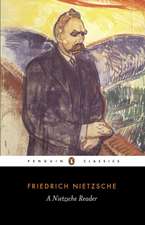Schopenhauer, Religion and Morality: The Humble Path to Ethics: Ashgate New Critical Thinking in Philosophy
Autor Gerard Mannionen Limba Engleză Paperback – 15 noi 2016
| Toate formatele și edițiile | Preț | Express |
|---|---|---|
| Paperback (1) | 489.26 lei 6-8 săpt. | |
| Taylor & Francis – 15 noi 2016 | 489.26 lei 6-8 săpt. | |
| Hardback (1) | 1005.01 lei 6-8 săpt. | |
| Taylor & Francis – 6 noi 2003 | 1005.01 lei 6-8 săpt. |
Din seria Ashgate New Critical Thinking in Philosophy
-
 Preț: 463.30 lei
Preț: 463.30 lei -
 Preț: 489.26 lei
Preț: 489.26 lei -
 Preț: 489.26 lei
Preț: 489.26 lei - 25%
 Preț: 324.16 lei
Preț: 324.16 lei - 16%
 Preț: 338.33 lei
Preț: 338.33 lei - 15%
 Preț: 444.10 lei
Preț: 444.10 lei - 18%
 Preț: 997.38 lei
Preț: 997.38 lei -
 Preț: 469.34 lei
Preț: 469.34 lei -
 Preț: 469.34 lei
Preț: 469.34 lei - 16%
 Preț: 299.06 lei
Preț: 299.06 lei -
 Preț: 469.34 lei
Preț: 469.34 lei - 17%
 Preț: 233.51 lei
Preț: 233.51 lei -
 Preț: 469.34 lei
Preț: 469.34 lei - 26%
 Preț: 765.04 lei
Preț: 765.04 lei -
 Preț: 489.26 lei
Preț: 489.26 lei -
 Preț: 469.34 lei
Preț: 469.34 lei - 26%
 Preț: 736.69 lei
Preț: 736.69 lei -
 Preț: 389.38 lei
Preț: 389.38 lei - 18%
 Preț: 1000.27 lei
Preț: 1000.27 lei -
 Preț: 469.34 lei
Preț: 469.34 lei -
 Preț: 469.34 lei
Preț: 469.34 lei - 26%
 Preț: 764.20 lei
Preț: 764.20 lei - 13%
 Preț: 338.33 lei
Preț: 338.33 lei - 17%
 Preț: 338.33 lei
Preț: 338.33 lei - 12%
 Preț: 312.43 lei
Preț: 312.43 lei - 18%
 Preț: 1000.27 lei
Preț: 1000.27 lei - 28%
 Preț: 739.02 lei
Preț: 739.02 lei -
 Preț: 480.40 lei
Preț: 480.40 lei
Preț: 489.26 lei
Nou
Puncte Express: 734
Preț estimativ în valută:
93.62€ • 98.45$ • 77.36£
93.62€ • 98.45$ • 77.36£
Carte tipărită la comandă
Livrare economică 17 aprilie-01 mai
Preluare comenzi: 021 569.72.76
Specificații
ISBN-13: 9781138263635
ISBN-10: 113826363X
Pagini: 328
Dimensiuni: 156 x 234 x 27 mm
Greutate: 0.45 kg
Ediția:1
Editura: Taylor & Francis
Colecția Routledge
Seria Ashgate New Critical Thinking in Philosophy
Locul publicării:Oxford, United Kingdom
ISBN-10: 113826363X
Pagini: 328
Dimensiuni: 156 x 234 x 27 mm
Greutate: 0.45 kg
Ediția:1
Editura: Taylor & Francis
Colecția Routledge
Seria Ashgate New Critical Thinking in Philosophy
Locul publicării:Oxford, United Kingdom
Cuprins
Contents: Introduction: Schopenhauer and Religion: Schopenhauer's worldview: hope or depair?; Militant atheist? Introducing Schopenhauer on religion; Metaphysics of the people: Schopenhauer, religion and truth; Schopenhauer and Morality: Reason and the foundation of ethics: Schopenhauer's rejection of the Kantian moral system; Kant, religion and morality: first steps on the 'humble path'; Mitleid and morality: interpreting Schopenhauer's ethics; Schopenhauer's humble path: Schopenhauer and the moral gap: the thing-in-itself, the will and beyond; The religion of Schopenhauer: searching for meaning and salvation; Conclusion; Bibliography; Index.
Recenzii
'... the book is a valuable and original contribution to the growing stream of publications on Schopenhauer.' Ethical Perspectives '... Gerard Mannion offers his readers a judiciously thought out, innovative and well researched 'religious' interpretation of Schopenhauer [...] that does full justice, in a way that few other commentators do, to the mystical elements of his thought. It is thus an original and desirable contribution to the existing secondary literature on Schopenhauer: an impressive monograph in itself, as well as being a rich source of information, reference and argument for philosophers and theologians interested in Schopenhauer's philosophy, most particularly insofar as it connects, as it so often does, with religious concerns.' Heythrop Journal
Descriere
This work challenges the textbook assessment of Schopenhauer as militant atheist and absolute pessimist. In examining Schopenhauer's grappling with religion, theology and Kant's moral philosophy, Mannion suggests we can actually discern a 'religious' humility in method in Schopenhauer's work, seen most clearly in his ethics of compassion and his doctrine of salvation. Given current debates between theologians and philosophers in relation to 'postmodernity' and 'postmodern thought', this book illustrates that Schopenhauer should be a key figure in such debates.



















